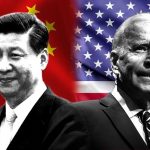China is committed to building a human community with a shared future because it believes that it is the best path forward for all the world’s people.
As an ancient Chinese philosopher observed, “all living things may grow side by side without harming one another, and different roads may run in parallel without interfering with one another.”
In a report to the 20th National Congress of the Communist Party of China (CPC), Xi Jinping, general secretary of the CPC Central Committee, stressed that while China has always been committed to the foreign policy goals of upholding world peace and promoting common development, it is now also dedicated to creating a human community with a shared future.
Only when all countries pursue the cause of common good, live in harmony and engage in cooperation for mutual benefit will there be sustained prosperity and guaranteed security, the report said.

A ‘shared future’ for all
President Xi first brought the notion of “a community with a shared future for mankind” to the world’s attention during a 2013 speech at the Moscow State Institute of International Relations.
“Mankind, by living in the same global village within the same time and space where history and reality meet, have increasingly emerged as a community of common destiny in which everyone has in himself a little bit of others,” he said.
In recent years, the world has been challenged by a rise in global crises that bind the fate of nations together closer than ever, from climate change to the COVID-19 pandemic. To effectively address them, governments must come together and take collective and coherent action.
In 2022, the devastating consequences of climate change were evident for all to see as frequent extreme weather events battered every corner of the globe. Unprecedented heatwaves swept Europe, causing destructive wildfires, severe droughts and thousands of deaths. In Pakistan, severe flooding put one-third of the country under water and damaged 1.8 million homes. In the U.S., powerful hurricanes left thousands of families homeless.
“Acknowledging a shared future demands that all of us challenge poor environmental decisions made by businesses or governments,” wrote Anthony Moretti, associate professor at Robert Morris University in the U.S. state of Pennsylvania, in an opinion piece for CGTN.
One of the major goals of building a human community with a shared future is for nations to achieve win-win cooperation, a concept best demonstrated by the China-initiated Belt and Road Initiative (BRI).
Since its introduction in 2013, the BRI has substantially boosted trade and investment activities throughout the world. The annual trade volume between China and the nearly 150 BRI participating countries expanded from $1.04 trillion in 2013 to $1.8 trillion in 2021 – a leap of 73 percent over eight years.
Under the initiative, China has brought its broad experience in manufacturing, telecommunication, infrastructure development and other areas to less-developed regions and countries, helping create numerous new jobs in local economies.
According to a World Bank report, the initiative has the potential to lift 7.6 million people out of extreme poverty and 32 million out of moderate poverty globally while boosting trade by 2.8 to 9.7 percent for participating countries and by 1.7 to 6.2 percent for the whole world.
Besides the BRI, China is also inviting countries around the world to take part in implementing two other initiatives in order to realize a “shared future,” namely the Global Development Initiative and Global Security Initiative.
“We will work with peoples of all other countries to champion humanity’s shared values of peace, development, fairness, justice, democracy and freedom to safeguard global peace and promote global development, and keep promoting the building of a human community with a shared future,” Xi said when meeting the press at the Great Hall of the People in Beijing in October.









